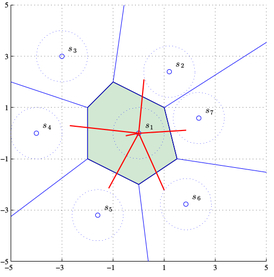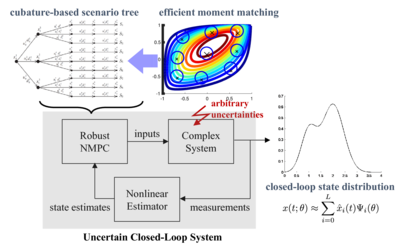Keynote Abstracts
Speaker |
Affiliation |
Tentative Title |
| Alberto Bemporad | IMT School for Advanced Studies Lucca (Italy) | Model Predictive Control: Dreams, Possibilities, and Reality |
| Jonas Buchli | Swiss Federal Institute of Technology (Switzerland) | Efficient optimal and learning control for real robots |
| Timm Faulwasser | Karlsruhe Institute of Technology (Germany) | |
| Paul Goulart | University of Oxford (UK) | Distributionally Robust Optimization for Chance-Constrained Systems. |
| Ali Mesbah | University of California, Berkley (US) | Moment-Matching Scenario Tree Generation for Robust Nonlinear Model Predictive Control under Arbitrary Probabilistic Uncertainty |
| Joe Qin | University of South California (US) | Data Analytics for Performance Troubleshooting of Feedback Controlled Manufacturing Plants |
| Angela Schoellig | University of Toronto (Canada) | Combining Model Predictive Control with Learning-Based and Adaptive Methods to Achieve Safety, Performance and Reliability in Robotics |
| Melanie Zeilinger | Swiss Federal Institute of Technology (Switzerland) | MPC for Learning-based Control with Constraints |
Alberto Bemporad
Model Predictive Control: Dreams, Possibilities, and Reality
|
Model Predictive Control (MPC) has become one of the most popular techniques adopted in industry to control multivariable systems in an optimized way under constraints on input and output variables. MPC hinges upon the availability of good dynamical models for prediction and good numerical solvers for real-time computations. For MPC to be applicable in industrial production one would like to reduce the time/difficulty involved in developing prediction models and also to have solvers that require limited resources (CPU time, memory), are numerically very robust, and are certifiable for worst-case execution time. In my talk I will present recent developments in data-driven design of MPC controllers and in embedded quadratic optimization, giving a concrete example of designs of multivariable MPC systems that are scheduled for mass production in the automotive industry in 2018. |
Jonas Buchli
Efficient optimal and learning control for real robots
| Nonlinear Model Predictive Control Algorithms are often considered too computationally demanding to be employed directly on real robots to generate and control agile behaviors such as walking, running, and flying. I will present our recent work on developing open source software that allows deploying nonlinear model predictive control on a wide range of nonlinear systems. I will show deployment on real robots such as quadcopter and legged robots using the full nonlinear rigid body dynamics and actuator dynamics. I will make an attempt to embed NMPC in the larger context of optimal and learning control and highlight some of the potential of this vantage point. I will show the use of such approaches to enable versatile, dexterous and agile robotics in applications in biomechanics and medical robotics, in archaeology, and in digital fabrication in architecture. |
Timm Faulwasser
Asymptotic stability of economic NMPC via gradient-correcting end penalties: The discrete-time case
|
|
Paul Goulart
Distributionally Robust Optimization for Chance-Constrained Systems
|
 |
Ali Mesbah
Moment-Matching Scenario Tree Generation for Robust Nonlinear Model Predictive Control under Arbitrary Probabilistic Uncertainty
|
We present an efficient framework for generating a “minimal” scenario tree for multi-stage NMPC, which is based on a recourse formulation that accounts for future measurements along different branches of the tree. The proposed framework enables providing closed-loop guarantees for constraint satisfaction and control performance when the uncertainty is modeled as a random vector with an arbitrary joint distribution (e.g., multi-modal and correlated) defined over an arbitrary set. Optimization-based moment matching is used to approximate probability integrals with a cubature rule that yields a drastically smaller number of scenarios than alternative multivariate integration methods such as quasi-Monte Carlo, sparse grids, and tensor products. We then demonstrate how the probability distribution of closed-loop states can be accurately and efficiently approximated using polynomial chaos theory to enable verification of chance constraint satisfaction using a limited number of closed-loop simulations. |
|
Joe Qin
Data Analytics for Performance Troubleshooting of Feedback Controlled Manufacturing Plants
|
Although manufacturing process systems collect and store massive amount of data from routine operations with computer control systems, most control theory and practice research to date have focused on either system identification where the data are collected with carefully designed experiments or on fault detection where the normal process models are assumed to be available. It is also clear that many processes have poor control performance and often exhibit dynamic oscillations, albeit with over a century of stability theory at hand. We make a proposition that these undesirable performances are due to uncertainty and abnormal situations that develop during routing operations and go beyond the capability of normal models. We further assert that routing data contain up to date situational knowledge about the process performance and abnormal situational knowledge, that can be effectively mined by properly analyzing operation data. Since the massive operation data are usually dynamic but are far from being fully excited, theory and methods are needed to analyze these data where the dynamics exist only in a subspace of the high dimensional measurement space. In this talk we first provide a historical perspective on the process data analytics based on latent variables modeling methods and machine learning, and the objectives to distill desirable components or features from measured data under routine operations. These methods are then extended to modeling high dimensional dynamic time series data to extract the most dynamic latent variables. Unlike principal component analysis where only variance is maximized for the extracted components, the dynamic latent variable methods extract dynamic components that are best predicted from their past values. We show with an industrial case study how real process data are efficiently and effectively modeled using these dynamic methods to extract features for process operations and control, leading to new perspectives on how process data are indispensable for manufacturing process troubleshooting, diagnosis, and effective control. |
Angela Schoellig
Combining Model Predictive Control with Learning-Based and Adaptive Methods to Achieve Safety, Performance and Reliability in Robotics
| Model Predictive Control is a powerful control paradigm for robotics due to its predictive capabilities and the possibility to include constraints directly in the decision making. However, in contrast to their early industrial counterparts, the next generation of robots (ranging from self-driving and -flying vehicles to robot assistants) is envisioned to operate alongside humans in complex, unknown and changing environments. Developing accurate models for these applications a-priori is challenging. In this talk, I will show how we combine model predictive control with data-based approaches to achieve safety, performance and reliability despite large uncertainties in the initial models. I will provide an overview of how we combined robust control schemes with data-based Gaussian process models to guarantee safe, online learning. I will then focus on our latest work related to developing safe learning controllers for dynamic environments, where conditions can change during the long-term operation of a robot (e.g., changing weather conditions or changing payloads). This work leverages ideas from L1 adaptive control and probabilistic experience recommendation. Algorithms run at high rates (50-70 Hz) and are demonstrated in vision-based, off-road driving and drone experiments. |
Melanie Zeilinger
MPC for Learning-based Control with Constraints
|
A new opportunity for pushing the performance of emerging complex, large-scale and variable control systems to the next level is offered by the capability of learning from data during closed-loop operation. Safety concerns when integrating learning in a closed-loop, automated decision-making process, however, represent a key limitation for leveraging this potential in many industrial applications.
In this talk, I will present techniques based on Model Predictive Control (MPC) concepts in order to ensure satisfaction of safety constraints while learning from data. I will first present a cautious MPC controller that can leverage data, but also takes into account residual model uncertainty to systematically improve performance and constraint satisfaction properties by integrating a Gaussian process model, where the specific focus will be on approximations enabling the approach for fast dynamical systems. Second, a framework for augmenting any learning-based controller with safety certificates is presented. Future constraint satisfaction under the learning-based input is verified, and the control input modified if required, based on robust MPC techniques. The ideas will be highlighted with examples from vehicle control.
|





